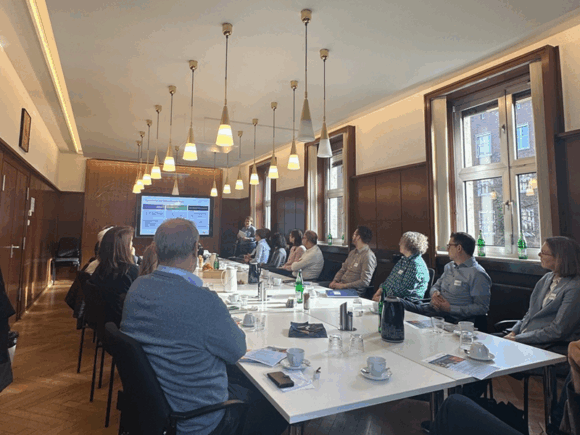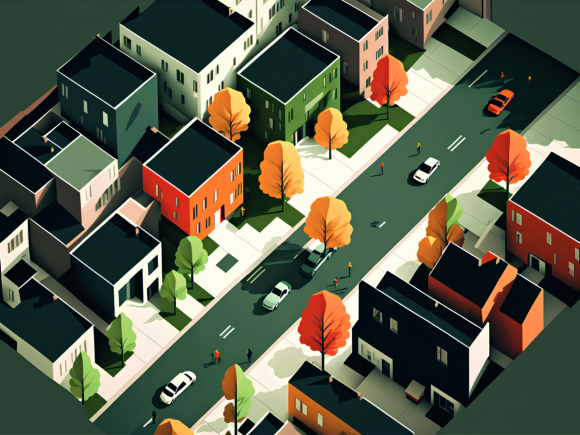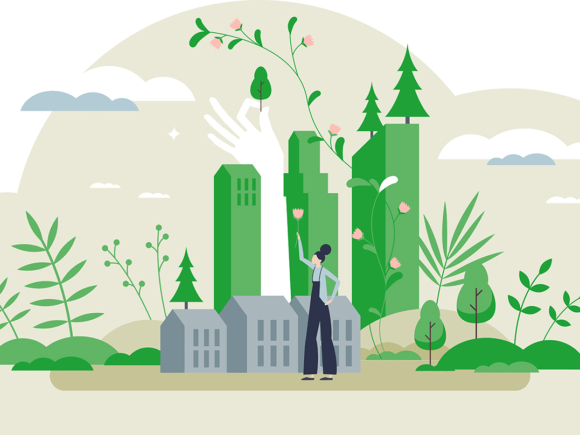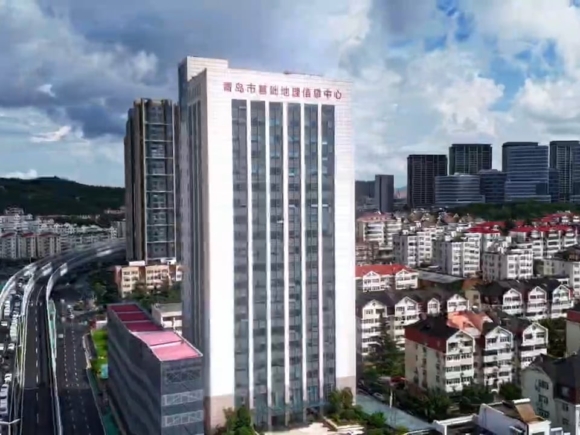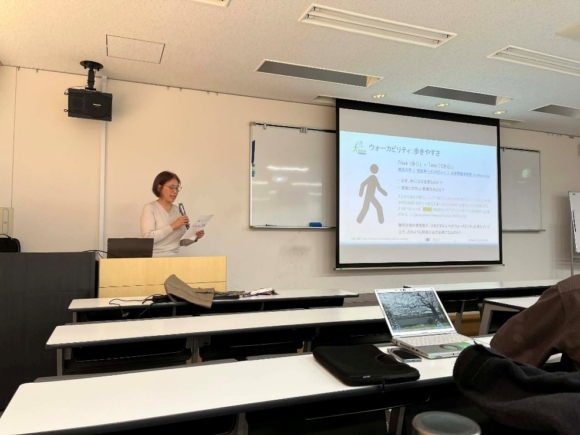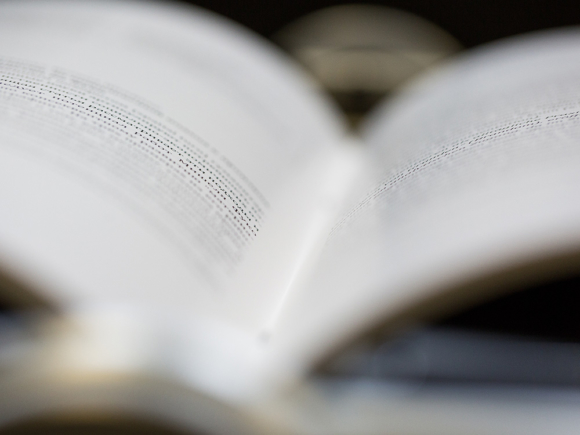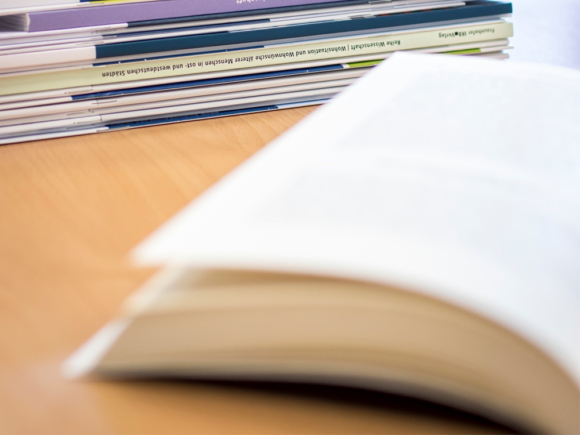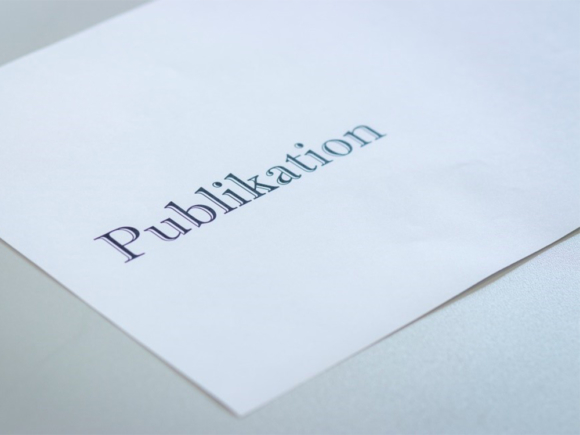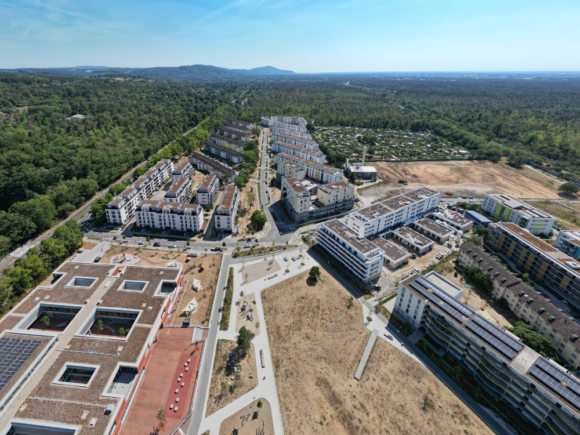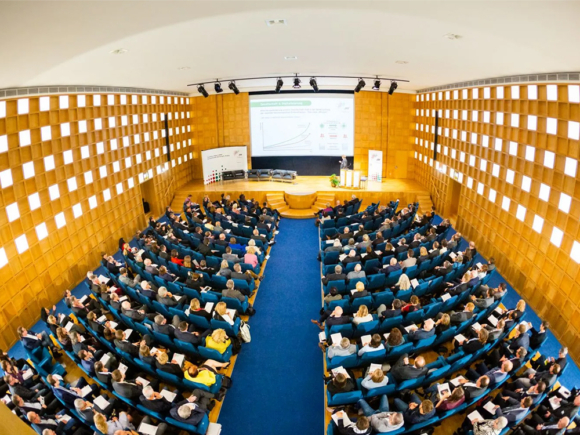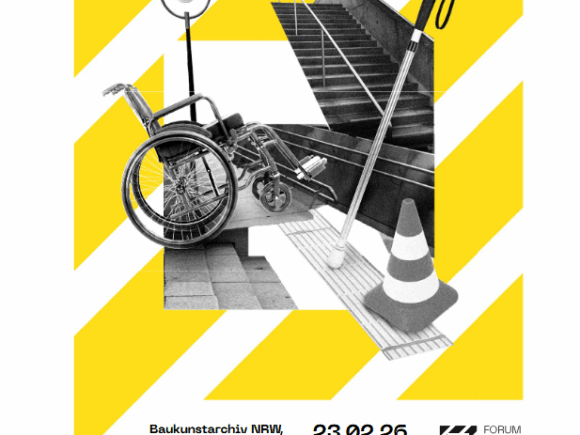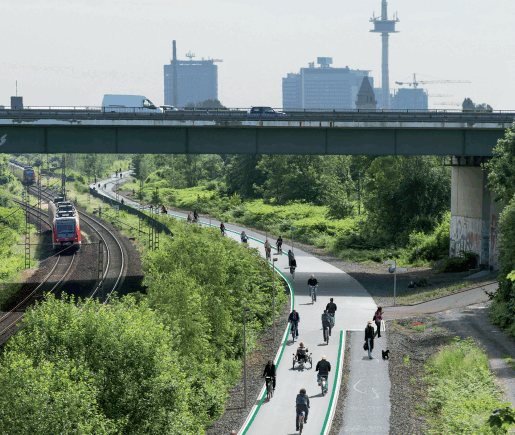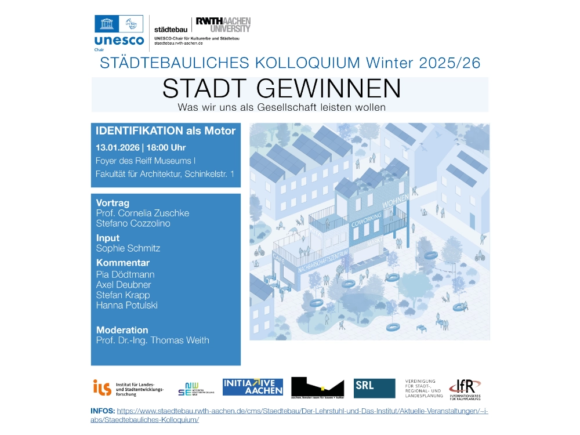Urban research − understanding urban change in its diversity
The process of urbanisation in the early 21st century is enormously dynamic: Urban spaces emerge, grow and change, their transformation takes many forms and is increasingly discontinuous and disparate. A better understanding of these processes is a central concern for the spatial urban researchers at the ILS. We investigate the various dimensions of urban change at different levels of scale and in international comparison. In active dialogue with practitioners, policy-makers and societal stakeholders, we gain important insights from this for the sustainable transformation and design of urban spaces.
We have three main research interests.
The process of urbanisation in the early 21st century is enormously dynamic: Urban spaces emerge, grow and change, their transformation takes many forms and is increasingly discontinuous and disparate. A better understanding of these processes is a central concern for the spatial urban researchers at the ILS. We investigate the various dimensions of urban change at different levels of scale and in international comparison. In active dialogue with practitioners, policy-makers and societal stakeholders, we gain important insights from this for the sustainable transformation and design of urban spaces.
We have three main research interests.
News
Die Sicht der Modellkommunen: Gemeinsame Diskussionen zum Förderbaustein „Dauerhafte Umnutzung von leerstehenden Ladenlokalen“
Am 25. Februar 2026 fand im Ministerium für Heimat, Kommunales, Bau und Digitalisierung des Landes NRW (MHKBD) das 14. Treffen der Arbeitsgruppe Ladenumnutzung als Workshop statt. Eingeladen hatten ILS und MHKBD. Vertreter*innen aus elf Modellkommunen, den Bezirksregierungen Arnsberg und Münster sowie zwei Quartiersarchitekten tauschten sich zu ihren Erfahrungen mit dem Förderbaustein „Dauerhafte Umnutzung von leerstehenden Ladenlokalen“ aus. Im Mittelpunkt stand die Bewertung des Förderangebots aus kommunaler Sicht sowie die Frage, welche Ansätze und Rahmenbedingungen sich in der praktischen Umsetzung bewährt haben. Die Diskussionen lieferten wertvolle Impulse und praxisnahe Erkenntnisse für die Begleitforschung des ILS. Mehr…
ILS-TRENDS 01/26: Gebäude und Freiraum: Nutzungskonflikte zwischen Parkdruck und Wohnumfeld
Die Schaffung von Wohnraum zählt zu den zentralen gesellschaftlichen Aufgaben. Dabei geht es nicht allein um die quantitative Bereitstellung, sondern auch um die Qualität der Wohnungen und ihrer Freiräume. An private Wohngrundstücke werden vielfältige Nutzungsansprüche gestellt: Wohnen, Erholung und Freizeitgestaltung, Raum für das Spielen von Kindern, aber zugleich auch für Erschließung, Stellplätze für Pkw und Fahrräder sowie Anforderungen an Sicherheit, Orientierung und technische Infrastruktur. Diese führen häufig zu Flächen- und Nutzungskonflikten. Innerhalb eines ILS-Projektes im Auftrag des Landes Nordrhein-Westfalen und in enger Kooperation mit der RWTH Aachen wurde der Nutzungskonflikt zwischen Flächen für Pkw-Stellplätze, Haus- und Feuerwehrzuwege, privaten Außenräumen und Grünflächen vertieft betrachtet. Zum Heft
Bericht aus der Forschung: Urbanes Grün im Klimawandel
Urbanes Grün leistet einen wichtigen Beitrag zur nachhaltigen Stadtentwicklung – besonders in dicht bebauten Innenstädten. Es kann dazu beitragen, die Auswirkungen des Klimawandels zu mindern. Der vorliegende Leitfaden „Urbanes Grün im Klimawandel“ zeigt Maßnahmen zur Grünflächenentwicklung vor dem Hintergrund der gestiegenen Bedeutung von Klimaanpassung im urbanen Raum auf. Viele Best-Practice-Beispiele zeigen wie die kommunale Umsetzung gelingen kann. Zum Bericht
Meilenstein im IMECOGIP-Projekt
Im Dezember 2025 wurde im Rahmen des IMECOGIP-Projektes das „Chinesisch-deutsche EnhancES Innovationsstudio“ in Qingdao eröffnet. Der lokale Praxispartner in Qingdao ist das Qingdao Surveying and Mapping Institute (QSMI). Unter anderem unterstützt das QSMI die Planung einer High-Tech-Entwicklungszone im Norden der Stadt, die nach den Prinzipien der Green City, Sponge City und CO2-neutralen Stadt entwickelt werden soll. Das in Zusammenarbeit mit der Ruhr-Universität Bochum und dem ILS entwickelte Tool „EnhancES“ ist dort ab sofort fester Bestandteil in der Planungspraxis. Mehr…
New Professorship through cross-appointment with Osaka University in Japan
From April 2026 Dr. Noriko Otsuka, who is a Senior Research Manager for Research Group Spatial Planning and Urban Design, will be appointed as a Specially Appointed Professor at Osaka University in Japan. Over the last 7 years D3 Centre has hosted her Associate Professorship through the ILS and Osaka University’s cross-appointment scheme. More… Mehr…
Publications
Step by step: Exploring accessibility perceptions of older adults and young families outside urban cores through walk-along interviews
ILS researchers Janina Welsch and Anna-Lena van der Vlugt, together with colleagues from the University of Groningen, have published an article in the Journal of Urban Mobility. The article publishes the initial results of the walk-along interviews from the AccessCity4All project. Based on interviews about perceived accessibility in the province of Groningen, one of the project’s case study areas, it presents new insights into the perceptions of two vulnerable groups regarding their experiences of walking and the accessibility of important facilities in rural and suburban settlements. https://doi.org/10.1016/j.urbmob.2026.100199. Further current selected papers can be found here.
Regelungen zum Flächenüberhang in der Windenergieplanung – Ein neues Flexibilisierungsinstrument hoheitlicher Planung mit Unsicherheiten
ILS researcher Jonas Marschall has published an article in the journal Die Öffentliche Verwaltung DÖV. In order to give planning regions more flexibility in meeting their regional sub-area targets for wind energy through interregional cooperation, several federal states have therefore adopted regulations based on the model of the Wind Energy Area Requirements Act, which are intended to empower planning regions to agree on a so-called ‘area surplus’ or ‘area compensation’. This approach is also innovative and interesting with regard to other areas of spatial planning. Particularly when it comes to limiting land use through state and regional planning, the tension between binding and flexible quantity-based control approaches poses a challenge. However, the specific regulations on land surplus raise questions. A closer look at the examples reveals differences and problems with the regulatory approaches. Further current selected papers can be found here.
The Reputation of Primary Schools—Rumours with Consequences for Segregation
ILS researcher Isabel Ramos Lobato and Andreas Wettlaufer (Ruhr-Universität Bochum) have published an article in the journal Tijdschrift voor Economische en Sociale Geografie. Taking up previous research, the article uses a mixed-methods design to investigate how the reputations of primary schools are established in discourses in a German neighbourhood in North Rhine-Westphalia and what role they play in school choice. It becomes clear that, in contrast to previous studies, the reputations of the local schools generally reflect their composition. Even if this does not mean that reliable conclusions about a school’s quality can actually be drawn from it, reputation is a very important school selection criterion across all social groups. Nevertheless, perceptions of individual primary schools vary in line with parents’ educational qualifications, contributing to school segregation. https://doi.org/10.1111/tesg.70060. Weitere aktuelle Fachpublikationen finden Sie here.
Entrepreneurs’ ‘Triadic Spatial Paradox’: theorising the hybrid home‑based business workspace experience
ILS researcher Cornelia Tippel and her colleagues have published an article in the International Small Business Journal: Researching Entrepreneurship. The article examines the significance of space in entrepreneurship and develops the conceptual model of the ‘Triadic Spatial Paradox’ based on the experiences of entrepreneurs operating home-based businesses (HBBs). It shows how entrepreneurs personally relate to and make sense of their dynamic hybrid home/workspaces and how they articulate the space-related paradoxes within their businesses. https://doi.org/10.1177/02662426251410801. Further current selected papers can be found here.
Belief-driven and socio-spatially effective? Transition pathways from car-oriented to car-reduced planning on the neighborhood scale
The ILS researcher Annika Schröder has published an article in the International Journal of Sustainable Transportation, co-authored by Sina Steele from Goethe University Frankfurt. The development of mobility concepts for newly built urban districts encounters structures and patterns of thinking that are oriented towards automobility. These pose significant challenges for innovative planning strategies. Using neighborhood developments in Darmstadt, Bielefeld, and Cologne as case studies, the authors examine the transformation process from car-oriented to car-reduced planning. Based on a complex interplay of belief patterns and socio-spatial factors (material, institutional, and cultural), they identify different pathways of a planning transition from car-oriented to car-reduced. They also show that, in practice, it appears promising to justify planning visions in a context-specific manner, to combine experimentation with institutionalization, and to disseminate planning experiences. https://doi.org/10.1080/15568318.2025.2598440. Weitere aktuelle Fachpublikationen finden Sie hier.
Events
Integrierte Mobilitätskonzepte für Neubauquartiere und Einzelvorhaben – Rechtliche Regelungsmöglichkeiten
Gemeinsam mit dem Zukunftsnetz Mobilität NRW laden wir dazu ein, die zentralen Erkenntnisse des Forschungsprojektes NaMoLi III – Nachhaltige Mobilität in Lincoln III, das sich am Beispiel der Lincoln-Siedlung in Darmstadt mit der Verstetigung und dem Transfer von innovativen Mobilitätskonzepten in Neubausiedlungen beschäftigt, zu diskutieren. Im Fokus der Veranstaltung am 26. März in Essen stehen rechtliche Instrumente zur Verankerung und Sicherung von Mobilitätskonzepten für Neubauquartiere und Einzelvorhaben. Weitere Informationen und Anmeldung
JRF Jahresfeier 2026
Am 13. April 2026 lädt die Johannes-Rau-Forschungsgemeinschaft (JRF) Mitglieder, Förderer, Partner, Freundinnen und Freunde sowie Interessierte zu ihrer Jahresfeier nach Düsseldorf ein. Im Mittelpunkt stehen zwei Impulsvorträge, die Energie als zentrale Zukunftsfrage aus unterschiedlichen Perspektiven beleuchten: als multidimensionale Gestaltungsaufgabe für Energiewende und Klimaschutz – und als wirtschaftspolitische sowie geoökonomische Realität. Der Vorstand blickt zudem auf das vergangene Jahr zurück. Das JRF-Kuratorium verleiht den JRF-Dissertationspreis 2026, bevor ein Science-Slam-Beitrag die Veranstaltung amüsant abrundet. Anschließend lädt ein Empfang zum Austausch, Vernetzen und Verweilen ein. Mehr…
Forum Stadtbaukultur: Versteckte Barrieren – Inklusive Lösungen
Mit dem Thema der inklusiven Stadtraumgestaltung und der Entwicklung innovativer Lösungen beschäftigt sich das transdisziplinäre Lehr- und Forschungsprojekt DEIN*ORT (Perspektive DEmenz: INklusion durch soziale Organisation, inklusive Raumgestaltung, personenzentrierte Technik) inklusive der Promotion von Friederike Asche. Die Veranstaltung innerhalb des Forums Stadtbaukultur ist als Abschlussveranstaltung Bestandteil des Forschungsprojekts. Sie präsentiert Ausschnitte der Projektergebnisse, transdisziplinärer Methoden, künstlerischer Interventionen und partizipativer Formate (z.B. den co-produzierten Film Please don’t freeze 1–2). Forum-Besucher*innen sind herzlich eingeladen, mit den Referent*innen zu diskutieren. Mehr…
25. Konferenz für Planerinnen und Planer NRW: Programm veröffentlicht
Am 13. März 2026 findet unter dem Titel „Infrastrukturen – Herausforderungen in der Transformation“ die 25. Konferenz für Planerinnen und Planer NRW beim Regionalverband Ruhr in Essen statt. Das Programm der Konferenz ist nun fertiggestellt und veröffentlicht. Auch die Anmeldung ist ab sofort möglich. Mehr…
Städtebauliches Kolloquium Winter 2025/26: IDENTIFIKATION als Motor
Am 13. Januar 2026 findet die Abschlussveranstaltung „IDENTIFIKATION als Motor“ des Städtebaulichen Kolloquiums der RWTH Aachen statt. Moderiert wird die Veranstaltung im Foyer des Reiff Museums von ILS-Wissenschaftler Prof. Dr. Thomas Weith. Dr. Stefano Cozzolino, ebenfalls vom ILS, wir in seinem Input über die gesellschaftliche Relevanz der urbanen Schönheit sprechen. Mehr…

